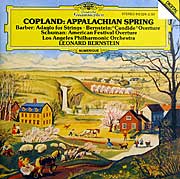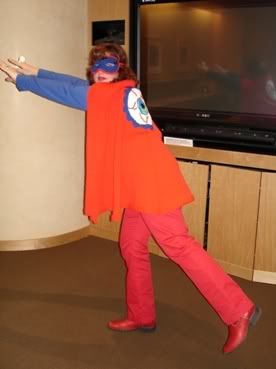On Tuesday night/Wednesday morning (see post below), I flew to NY to be with the family. Peter came back from school, at the tail end of his glee club's Spring Break Atlantic Coast tour. Anika and her husband and kids came down from Syracuse, and Jacob, Rachel, Rebekah, Mom, and Dad stayed (for the most part) exactly where they were on Long Island. (The other siblings and nieces and nephews were with us, but primarily in heart.) And, with this crew (and some adopted others), we participated in an unprecedented number of cultural events in one whirlwind weekend of such beautiful greatness.
Friday, March 28
Appalachian Spring
With family and friends in tow (and babysitters and niece and nephews at home), we drove into New York
 City to see a modern dance performance at Julliard. The draw? "Appalachian Spring," by Aaron Copland, our family's favorite piece of classical music, as choreographed by the famous Martha Graham. There were two additional pieces on the program--we're having trouble recalling their titles now--but Appalachian Spring was what we were there for. It was absolutely one of the most beautiful things I've ever seen. And I felt like my love for the music all these years was justified. I knew, I guess, what I was doing when I started loving that piece. My mother gave my father a record of Appalachian Spring on their wedding night, and they have been playing the record since we were small. The piece is quintessential Americana, and it was written as a dance for eight people--a bride, a groom, a preacher, a pioneer woman, and four silly girls, dressed in light blue skirts with bonnets and frilly sleeves. The set was spare, with a Shaker rocking chair on stage right, for the women to sit in, stoically, happily, periodically. The bride and groom looked clean-faced and sunny. The pioneer woman never shook, never wavered, as she lifted her leg high above her head, as she comforted the bride after the preacher (a creepy, creepy guy who spent too much time with the silly-sleeved girls) seemed to reprimand her or the groom for something, for something. I sat in the front row between brothers Jacob and Peter, with Rebekah and Rachel and friend and friend, friend, friend to our left. It was beautiful to be there and, of course, we danced down the street on our way to the parked car, on our late-night way home.
City to see a modern dance performance at Julliard. The draw? "Appalachian Spring," by Aaron Copland, our family's favorite piece of classical music, as choreographed by the famous Martha Graham. There were two additional pieces on the program--we're having trouble recalling their titles now--but Appalachian Spring was what we were there for. It was absolutely one of the most beautiful things I've ever seen. And I felt like my love for the music all these years was justified. I knew, I guess, what I was doing when I started loving that piece. My mother gave my father a record of Appalachian Spring on their wedding night, and they have been playing the record since we were small. The piece is quintessential Americana, and it was written as a dance for eight people--a bride, a groom, a preacher, a pioneer woman, and four silly girls, dressed in light blue skirts with bonnets and frilly sleeves. The set was spare, with a Shaker rocking chair on stage right, for the women to sit in, stoically, happily, periodically. The bride and groom looked clean-faced and sunny. The pioneer woman never shook, never wavered, as she lifted her leg high above her head, as she comforted the bride after the preacher (a creepy, creepy guy who spent too much time with the silly-sleeved girls) seemed to reprimand her or the groom for something, for something. I sat in the front row between brothers Jacob and Peter, with Rebekah and Rachel and friend and friend, friend, friend to our left. It was beautiful to be there and, of course, we danced down the street on our way to the parked car, on our late-night way home.Saturday, March 29
I. Sunday in the Park with George
In true Olson fashion, Mom and Dad needed to go down to DC for the day, so I took them to the airport at 5:30. After dropping them off, I slept in their bed on my mom's hea
 ting pad until 9:30, when I woke to rouse the crew and usher us all out the door. We drove and parked and subwayed for over an hour until we wound our into midtown and then, la, we were at the theatre. And we were going to see Sunday in the Park with George. My parents first saw a production of this in the mid-80s, when it came out. It has never been on Broadway, I don't think, though it won a Pulitzer Prize in the wake of its original off-Broadway production. It's a musical by Stephen Sondheim, with book by James Lapine (yes, the duo that wrote Into the Woods--the similarities were more obvious to me this time around), about the (fictional) life of impressionist artist George Seurat. My sister spearheaded the viewing, purchasing tickets for the whole family ("gifts," she said) and corralling enough of her friends and our loved ones to merit a group ticket discount. We sat in literally the last two rows high on the highest mezzanine, and we watched, trying hard (at least, Anika and I were trying hard) not to sing along. We've been listening to the original cast recording since 1986 or something, and Mandy Patinkin and Bernadette Peters' performances are as much a part of my brain waves as--I don't know, as that creepy line from the New Testament recorded tapes we used to listen to as kids ("My name is Leee-juunnn. Legion means many. There were maaaan-y devils inside that man."). Or more. Since I know the musical better than I know the Star-Spangled Banner. And that is not hyperbole.
ting pad until 9:30, when I woke to rouse the crew and usher us all out the door. We drove and parked and subwayed for over an hour until we wound our into midtown and then, la, we were at the theatre. And we were going to see Sunday in the Park with George. My parents first saw a production of this in the mid-80s, when it came out. It has never been on Broadway, I don't think, though it won a Pulitzer Prize in the wake of its original off-Broadway production. It's a musical by Stephen Sondheim, with book by James Lapine (yes, the duo that wrote Into the Woods--the similarities were more obvious to me this time around), about the (fictional) life of impressionist artist George Seurat. My sister spearheaded the viewing, purchasing tickets for the whole family ("gifts," she said) and corralling enough of her friends and our loved ones to merit a group ticket discount. We sat in literally the last two rows high on the highest mezzanine, and we watched, trying hard (at least, Anika and I were trying hard) not to sing along. We've been listening to the original cast recording since 1986 or something, and Mandy Patinkin and Bernadette Peters' performances are as much a part of my brain waves as--I don't know, as that creepy line from the New Testament recorded tapes we used to listen to as kids ("My name is Leee-juunnn. Legion means many. There were maaaan-y devils inside that man."). Or more. Since I know the musical better than I know the Star-Spangled Banner. And that is not hyperbole.Anyway, it was beautiful. So beautiful, to see it on stage, surrounded by these people I love. The performances weren't as great as Patinkin's and Peters' (but whose are? they're the best), but I did cry. Anika was cutting onions next to me. No, the themes--I kept wondering--why did these themes resonate with me when I was seven? ten? twelve? sixteen? Seurat loses a woman he loves because he cannot focus on her, can only concentrate and work on his painting, on seeing and creating. And she loves him for his genius and his vision, but she is trying to become a better person--to learn to read, to be able to focus, to make good decisions--and she is trying to be loved in a real, human way. Maybe the piece is about a detachment I always toyed with. I'm not really a tortured genius, but I do have desires sometimes to don lab coat and poke at people, prod them and exploit their humanity (via writing mostly), rather than meaningfully interact with them. Maybe I felt that from when I was a child, or maybe I saw that in my brilliant siblings, or maybe I just felt the truth of that--that that's a tension that sometimes, awfully, sometimes happens. But mostly, I think, mostly now, I feel like the woman's character. I dated a composer, a music composer, and I wondered what it would be like to be forever with a man who thought more easily and fully about chord structure and tonality than about me. I loved him for his brilliance of course. For his genius. Everybody does. But we would listen to romantic music, and I would think, "This is beautiful. I wonder if he is thinking of me." And I would look at him, and I would know that he wasn't. Maybe it wasn't his just his love for music--maybe he just didn't love me that much or that way--and this is a possibility I'm willing to accept. But still, I wondered about it, about a life like that, attached to a genius who, in order to produce, would need to hide in a corner--literally, in a dark corner--and not talk, not be interrupted, not see me or us or our children. But then, after that, after all that, or intermittently throughout it, would pull out this beautiful, incomparable, inexplicable moment of genius. The music of genius. And he would keep working, trying always to produce something more beautiful, more true, more lucrative, more genius. And I would try to make dinner and keep the kids from being always dirty and always fighting.
I have lived with genius(es). Daily, it can mean trouble. But good goo--what a world we would have without genius. The woman, Dot, says all the insightful things in the musical, actually. And, at one point, she says this: "But most, George, of all. But most of all. I love your painting."
II. The Harvard Glee Club
It's true. My brother Peter is in the Harvard Glee Club. He and his friend, another LDS freshman, showed up at our house Friday afternoon, with tuxes in tow. They came with us to Appalachian Spring, to Sunday in the Park with George, to the cheap (but satisfying) Chinese restaurant we frequented after the show, and then, la, it was their chance on stage. Or in nave, as the case was. We went to St. Bart's and watched them sing with the 60-ish other boys of the Harvard Glee Club. Tuxes with tails, Harvard fight songs, and a tall, tall Episcopalian church on a Saturday night make for a funny time (and some unwitting similarities to movies like Chariots of Fire). And Peter came down afterwards, so happy, so invigorated by his fist-pumping and the glory of the tone of these sixty earnest men. And it was a delight to see Harvard doing what Harvard does best--be great.

That's it. Then we wandered back to the subway, back through a number of subway transfers, and we danced and waited and missed trains, and then walked through the midnight of empty streets in Queens and drove our way home. I went to bed with my family and friends still up and talking, drinking hot apple cider and eating such good chocolate. It was a nice background for my prayers.










